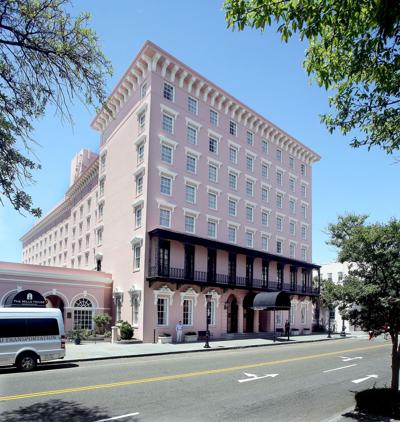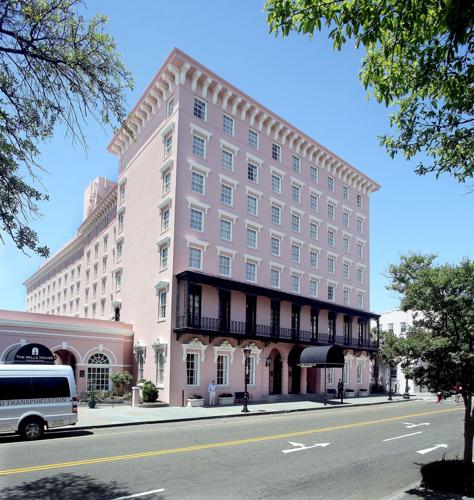In basketball jargon, BET founder and billionaire investor Robert L. Johnson is in the paint, squaring up to take a shot.
It might not be the easy layup that it appears to be, for a couple of reasons.
The urge to merge that’s sweeping the nation is uniting a pair of hotel chains with three South Carolina properties, including one with a rich past.
The deal would make Johnson, the onetime Charlotte Bobcats owner and the executive chairman of RLJ Lodging Trust, a more formidable player in the hospitality game.
His Bethesda, Md.-based company last week said it plans to acquire smaller rival FelCor Lodging Trust Inc. in an all-stock deal valued just shy of $1.2 billion.
“This merger creates a company that has greater reach in key markets with a streamlined operating structure and more advantageous cost of capital," FelCor CEO Steven Goldman said in a statement. "FelCor shareholders are receiving an attractive valuation for the company’s hotel assets and have the opportunity to benefit from a highly respected management team with a history of value creation.”
If the sale goes through, RLJ would control 160 hotels in 26 states and Washington, D.C., selling rooms under various flags, including Marriott, Hilton, Hyatt and Wyndham. Its projected stock market value would exceed $4 billion
Those numbers would make RLJ the third-largest "pure play" real estate investment trust - or REIT - that focuses exclusively on lodging assets. Its next bigger rival would be Apple Hospitality REIT, which owns a pair of hotels in Columbia and one each in Greenville, Hilton Head Island and North Charleston.
Some experts are skeptical about the tie-up, in part because the companies cater to different types of guests. Also, a FelCor-RLJ merger would result in overhead savings of $22 million, which Green Street Advisors analysts called “only marginally beneficial.”
“On the operational front, while there are similarities in operating select-service and compact full-service hotels, it’s not clear what advantage is gained from combining these two portfolios,” they added in a research note.
In any event, the FelCor acquisition would beef up RLJ's presence in South Carolina, where its sole property is at 125 Calhoun St. It paid $42 million when it bought the 176-room Courtyard by Marriott Charleston Historic District more than five years ago.
Now it's looking to take over a 39-hotel portfolio that includes the Embassy Suites Myrtle Beach-Oceanfront Resort in Kingston Plantation.
One of the other notable accommodations in that bunch is the Mills House in downtown Charleston. The prominent pink lodging sits about a mile or so south of RLJ's other peninsula property.
A hotel has operated on the southwest corner of Meeting and Queen streets since 1853, when grain merchant Otis Mills invested $200,000 to open the 180-room Mills House. The building survived the Civil War, and its guest list included Gen. Robert E. Lee, who spent the night in 1861. President Theodore Roosevelt checked in during a Charleston visit in 1902, around the time antebellum property was switched its named to St. John Hotel.
The rebranding didn't help, at least over the long run. The hotel went into a gradual state of decline as new competitors cropped up, and it was sold at auction in 1968. The buyers, a group that included Wall Street executive Dick Jenrette, had planned to restore the existing historic structure. But the fragile bones were beyond repair.
After demolishing the building in 1969, the developers built a slightly larger 217-room replica that opened the next year as the Mills Hyatt House. The property switched flags at least twice over the last 48 years. FelCor bought it in 1998 and has operated it as the Mills House Wyndham Grand Hotel since 2013.
Unbeknownst to most guests, the owner has been coming under siege from frustrated shareholders. An activist investor wrote management last fall demanding a review of "strategic alternatives," including a sale of the entire business.
Snow Park Capital Partners peppered that October missive with some tough talk, saying FelCor's stock had delivered a negative 60 percent return in the previous decade, an amount equal to about $750 million, and that the hotel operator's "22-year experiment as a publicly traded company is a failure by any objective measure."
A buyer appeared at the front desk in February. Ashford Hospitality Trust of Dallas proposed to acquire its crosstown competitor for about $1.27 billion, using its stock to finance nearly 80 percent of the purchase.
FelCor responded that the bid undervalued its business, while adding that it would consider a deal with substantially more cash.
The seller apparently changed its mind by last Monday, agreeing to take RLJ's lower all-stock offer. That was four days after Ashford amended its more complicated buyout proposal by increasing the cash portion.
The jilted bidder could still try to box out RLJ by submitting a counteroffer, but it made no such suggestion last week. Instead, Ashford went public with the sequence of events that led up to the sale agreement. It also expressed its disappointment that FelCor's board "decided not to meaningfully engage on the recently revised offer.”









